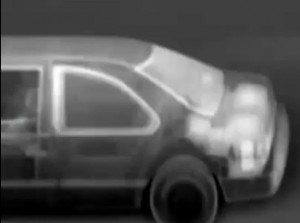 A new product called the Backscatter Van (video) seems ripe to violate your 4th amendment rights. The van, produced by the American Science & Engineering company, is essentially a mobile backscatter x-ray scanner. This is the same technology used in those new airport scanners. The difference here being that the unmarked van can surreptitiously scan your car, house, storage locker, or any other unshielded structure it can drive near.
A new product called the Backscatter Van (video) seems ripe to violate your 4th amendment rights. The van, produced by the American Science & Engineering company, is essentially a mobile backscatter x-ray scanner. This is the same technology used in those new airport scanners. The difference here being that the unmarked van can surreptitiously scan your car, house, storage locker, or any other unshielded structure it can drive near.
The company has sold over 500 vans to various domestic and foreign governments. And Joe Reiss, a vice president of marketing, has revealed that at least some of the units have been purchased by domestic law enforcement.
While the units are ostensibly to be used to locate explosives, dirty bombs, and other terror related paraphernalia, it’s almost inconceivable the vans won’t eventually be deployed to search for contraband, drugs, and back seat passengers without seat belts. Meanwhile Reiss opines, “From a privacy standpoint, I’m hard-pressed to see what the concern or objection could be.”
Really? The Supreme Court has already ruled that thermal imaging a home constitutes a 4th Amendment search, and therefore requires a warrant. And thermal imaging generates much lower resolution images than backscatter x-ray. It’s virtually inconceivable the ruling on this new technology would be more lenient. Further, it’s well established that the insides of cars, trucks, and other vehicles are not searchable without a warrant or probable cause. Therefore, randomly x-raying vehicles can’t possibly be legal.
Could there still be a role for this tech when used in conjunction with proper judicial process? Sure, but like wire tapping, thermal imaging, and other remote monitoring techniques there will be ample opportunities for misuse and abuse as well.
The 4th Amendment assures us a right to a reasonable expectation of privacy. Yet, in a world where almost everyone has a camera in their pocket, where it’s commonplace for stores or street corners to have surveillance equipment, where almost all transactions are recorded electronically, and almost all communication is electronically vulnerable there is increasingly little privacy to be expected. Now we can be seen moving about inside our homes and hauling groceries home in our cars.
In part, I wish my life was interesting enough to warrant all that monitoring. But just because it’s not doesn’t mean it’s okay to surveille me anyway. That’s not how fundamental rights work in this country. At least it didn’t used to be.
